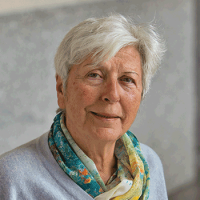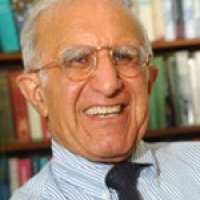A Year of Crisis: The Middle East in 2015
Four experts explored the crises facing the Middle East in 2015, the involvement of the United States in the region, and the trajectory of Middle Eastern states.
On January 20, 2015, the Middle East Program at the Woodrow Wilson Center hosted a discussion “A Year of Crisis: The Middle East in 2015” with Robin Wright, USIP-Wilson Center Distinguished Scholar; Marina Ottaway, Senior Scholar, Woodrow Wilson Center; Shaul Bakhash, Clarence Robinson Professor of History, George Mason University; and Max Rodenbeck, Fellow, Wilson Center. Michael Van Dusen, Senior Advisor, Woodrow Wilson Center, moderated the panel.
Wright opened with an overview of what she described as a failed region plagued by civil war, issues of succession in Saudi Arabia, Algeria, Oman; the return of autocracy in Egypt; and the redrawing of borders in Iraq and Syria. No country is immune from the rise of extremism. Tunisia is the most democratic state in the region, yet it has also provided the largest number of foreign fighters to ISIS in Syria. In a telling reflection of the issues still not addressed in so many countries, the lowest turnout in the first democratic presidential election was in Sidi Bouzid, the birthplace of the Arab Spring four years ago. The biggest threat of 2015 is from extremists who have taken control in places where peaceful change dissolved into violence, notably Syria, Iraq and Libya, from the Islamic State and al Qaeda franchises such as al Qaeda of the Arabian Peninsula and al Nusra Front. These groups have redefined the region both politically and geographically; they now control territory and have drawn international support of more than 18,000 foreign fighters. The impact has also created the world’s worst humanitarian crisis since World War II, producing 3.8 million refugees that have spilled over into Turkey, Lebanon, Jordan and Iraq—with no end in sight to either the war or its consequences in the region.
Bakhash began with a discussion of recent contrasting statements made by Iranian President Hassan Rouhani and Supreme Leader Ali Khamenei. Rouhani articulated that Iran’s principles are reflected not in the number of centrifuges in Iran, but in the intelligence and the ability of its people, which he believes can be demonstrated through the end of sanctions and Iranian involvement in the world economy. In contrast, Khamenei asserted Iran’s traditional suspicion and hostility toward the West and emphasized the need for an economy not dependent on the end of sanctions. Bakhash noted that Iran faces a familiar crossroads when conservative groups in the past have proven too powerful to allow for progressive political outcomes. However, Bakhash noted that the economy has been crippled by sanctions and now faces unexpectedly low oil prices that will make for difficult domestic decisions if there are sustained sanctions and no nuclear deal.
Rodenbeck started his discussion by stating the Gulf Cooperation Council (GCC) states have experienced a recent history of relative peace and increased wealth as oil prices have historically been on an incline. Despite the sudden drop in prices, Rodenbeck noted that the GCC states have amassed $2 trillion in sovereign assets and are poised to retain their status quo despite turbulence in the region. He believes the largest underlying reason for Saudi Arabia’s support for low oil prices stems from the fear of a gradual shift in the auto industry from oil to other fuel resources; low oil prices could sustain the continued demand of oil and would not economically harm large oil producers. In Saudi Arabia and Oman, upcoming royal successions present the possibility of policy shifts and more dynamic economic policies. In Qatar and the UAE, the small ruling elite has been increasingly present in the region from funding the current government in Egypt and secret involvement in the conflict in Libya. Lastly, a growing impatience with the United States and its shaky policies with Iran as well as a lack of any long-term commitment in the Gulf present a growing threat to the status quo.
Ottaway began by discussing the failure of the January 25 revolution in Egypt to alter the status quo. Since 2012, Egyptian policies have been more restrictive to political participation by political parties as well as NGOs; political parties only have 120 out of the parliamentary 500 seats, and Egyptian NGOs cannot receive outside funding without permission from the government. Beneath all the political turmoil, Ottaway notes, the military remains a constant by exerting political control through banning demonstrations and limiting freedom of expression. The government has taken small steps to control excessive power used by the courts, however formal political change remains absent. While another uprising seems unlikely, the current unrest between the state and the general population shows a lack of change as a result of the revolution four years ago.
During the question and answer portion of the event, Ottaway responded to a question about Western religious influence on the crises in the Middle East. She emphasized that the West should avoid the promotion of generalized interpretations of Islam, which could lead to pushback in the region. Regarding Egypt, Rodenbeck noted that the Egyptian government needs to present itself in a more positive light, as well as attempt to fix issues of political divisions domestically in order to achieve a better reputation abroad. Wright noted that the United States currently possesses little influence in the region, and that its policy toward Syrian President Bashar al-Assad has been neglected despite the U.S.-led coalition against ISIS. She discussed that large numbers of Western fighters among ISIS retain familial ties to the region which affects the large influx of fighters. Lastly, the panel discussed Russia and Iran’s competing influence in the region, noting that the United States is willing to promote a Russian-sponsored peace deal if all parties participate. Ottaway said the Unites States’ limited military action in Syria—the “no boots on the ground” plan—lacks a sustainable long-term plan for the region.
By Jessica Wisniewski
Speakers


Former Senior Research Associate and Head of the Middle East Program, Carnegie Endowment for International Peace


Middle East Bureau Chief, The Economist
Hosted By

Middle East Program
The Wilson Center’s Middle East Program serves as a crucial resource for the policymaking community and beyond, providing analyses and research that helps inform US foreign policymaking, stimulates public debate, and expands knowledge about issues in the wider Middle East and North Africa (MENA) region. Read more
